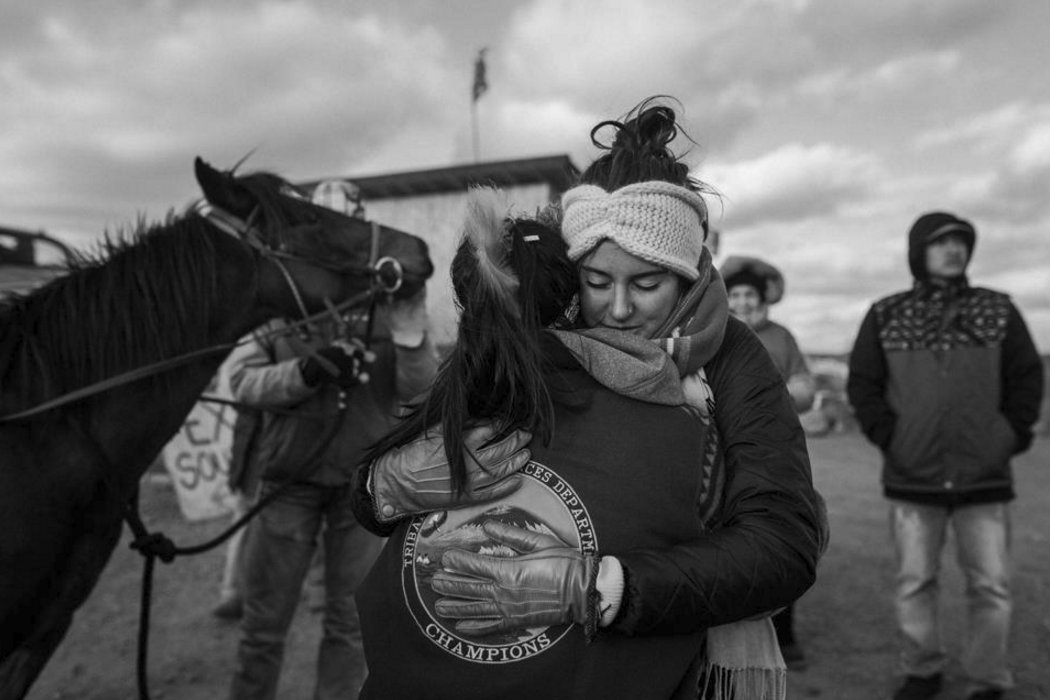Breaking: 2016 sucked. Not in the usual way life sucks, like the way a bowl of rice pudding sucks, a milquetoast, flavourless gruel that masquerades as a dessert while quietly eroding your ability to enjoy even the simplest of life’s pleasures.
No, 2016 sucked like cancer. It was a canvas of pimples and boils in the care of an overzealous teenager. We sat helpless as he attacked every pustule with increased ferocity and relentlessness, each one bigger and more putrid than the last. Then someone elected him president.
A recap: The attacks in Paris. Brussels. Lahore. Istanbul. Nice. Istanbul. The hate-crime shooting at the Pulse nightclub in Orlando. Brexit. Fentanyl. Aleppo. Aleppo. Aleppo.
David Bowie, Prince, Leonard Cohen, Muhammed Ali, Gene Wilder, Alan Rickman. Donald Trump’s nomination as Republican presidential candidate. Donald Trump’s election campaign. Donald Trump actually getting fucking elected and then Donald Trump as president-elect picking white supremacists and climate change deniers for his cabinet.
That’s not even the Coles Notes version. That’s the I’m-still-in-triage version.
But you know all that. 2016 has already become a euphemism for calamity. “It’s 2016” is what you say now after you get drunk at your holiday work party, make fun of how your boss’s son says “abortion” and then puke on his shoes. Just kidding, I’m a freelancer. I don’t have work parties. It’s 2016.
But it doesn’t have to be that way. The shocking thing is maybe it’s not as bad as all that. Just because the whole world is soaked in kerosene doesn’t mean we have to start giving away matches. It’s true: we have a lot of work to do to repair the catastrophe and heartache 2016 has left in its wake, but here are six stories that remind us that we still have a fighting chance.
This is not nothing. Take these victories and hold them close. They were hard fought and hard won. They belong to us, now. So grapple them to your hearts with hoops of steel, so they can light the way for 2017.

1. A national inquiry into Missing and Murdered Indigenous Women and Girls. Like many of the victories on this list, this wasn’t a definitive win. There are areas of serious concern, like its limited scope and its failure to hold law enforcement agencies to account for their criminal neglect or systemic failures. But make no mistake: this inquiry was not bequeathed to us by a benevolent and tearful Justin Trudeau. It is the direct result of work by women who are at once the most marginalized in Canada and the most fearless and relentless.
The Native Women’s Association of Canada fought for 11 years to make this happen, much of that against a Stephen Harper government that was outright hostile to the idea of bringing justice to the families of the missing and murdered. They put it on the national radar and they made it an election issue — and it helped change governments. Stand in awe of this work because, now, we have a national inquiry.
Image: Lenee Son
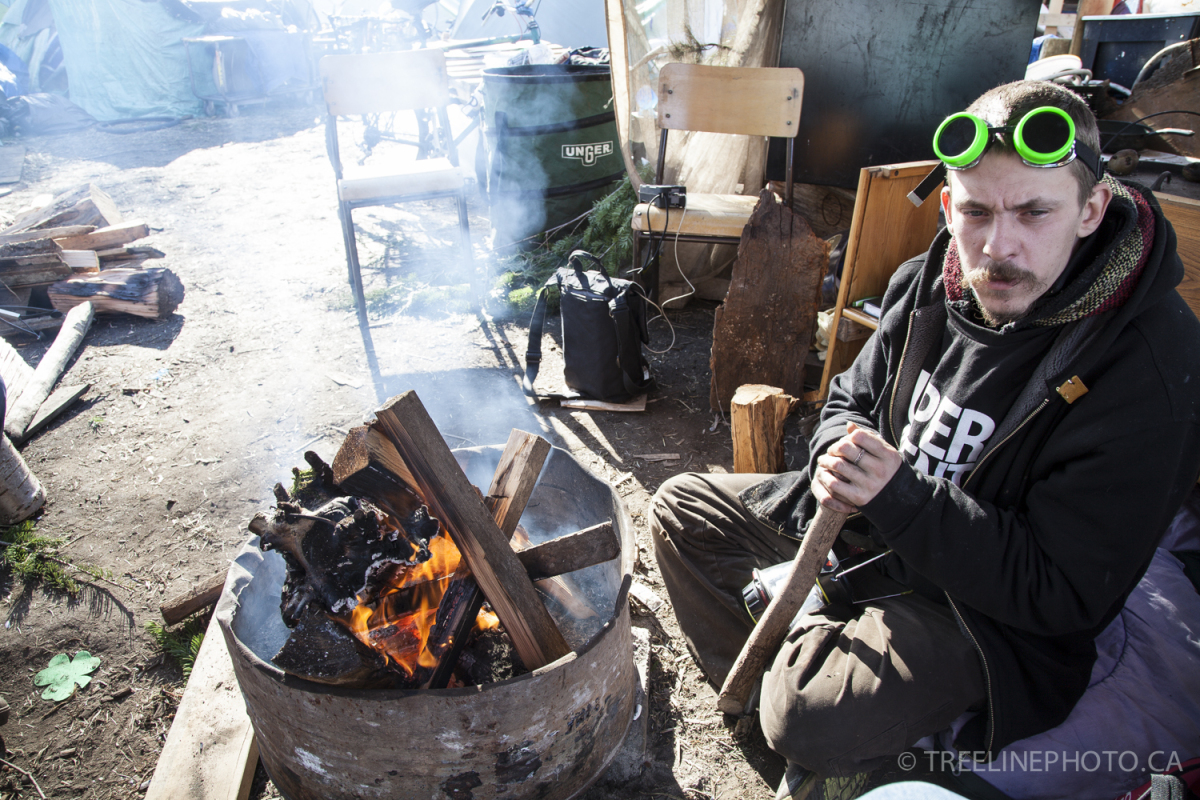
2. Victoria’s Tent City wins social housing. In November 2015, several people without homes and their allies took up occupation of the federal courthouse lawns in Victoria, B.C. Camping in parks is legal in Victoria thanks to a B.C. Supreme Court case in 2008, so the city rewrote its bylaws permitting police to evict campers at 7 a.m. Super InTentCity, as its founders named it, exploited a loophole by camping on the courthouse grounds — which, as provincial property, are not subject to Victoria’s bylaws.
Still, Christy Clark’s Liberal government requested an injunction to remove the campers, but, incredibly, the B.C. Supreme Court ruled in favour of the tent city in April. Justice Christopher Hinkson’s ruling lauded the leadership of the camp, its sense of community and its access to health and social services. While the province would secure its second request for an injunction in July, it wasn’t before SiTC won 140 units of permanent social housing for the city’s homeless population. Super inTentCity is an incredible story of perseverance, organization and community.
Image: IntentCity.ca
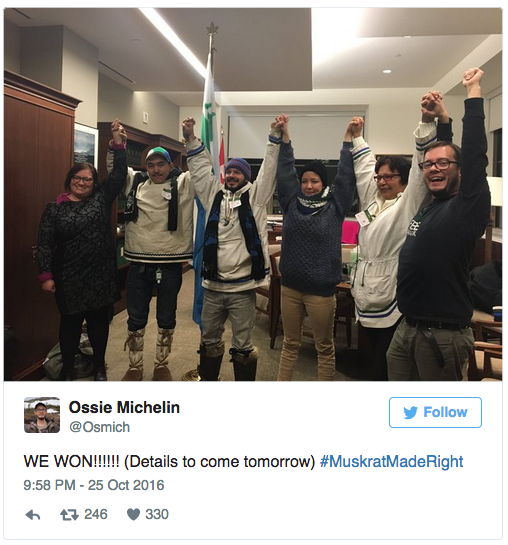
3. Muskrat Falls. On October 22, about 60 land protectors occupied the Muskrat Falls hydroelectric dam construction site in Labrador after someone cut off the lock to the gates. It was an escalation of ongoing protests and a blockade in opposition of a plan to flood traditional Innu and Inuit territory and risk methylmercury exposure to local communities. Reports of violent arrests — as well as a court-ordered subpoena of journalist Justin Brake, the only reporter covering the occupation — brought the action to national attention.
After an emergency 13-hour meeting, the government of Newfoundland and Labrador and leaders of the Nunatsiavut Government, NunatuKavut Community Council and the Innu Nation reached an agreement. Nalcor, the corporation behind the dam, had to wait for Indigenous leaders’ approval before going ahead with the project. The agreement compels Nalcor to return water levels to normal after initial flooding to allow independent environmental and health assessments to move forward. The victory is cautious — and the land protectors remain suspicious of the provincial government’s sincerity, but one of the smallest corners of the country stood up against colonialism — and colonialism blinked.
Image: Twitter/Ossie Michelin
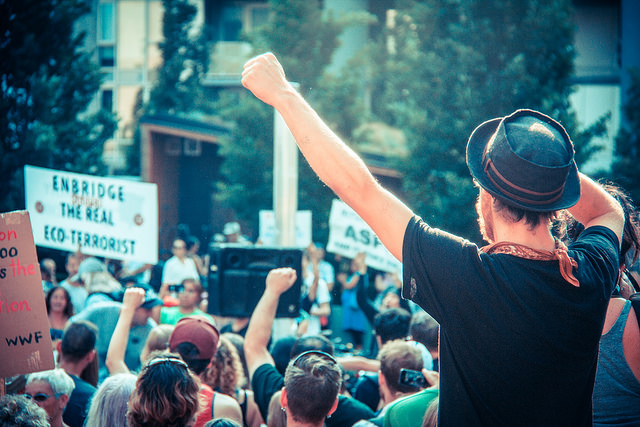
4. Northern Gateway pipeline defeated. This one simply doesn’t get enough credit, largely because its announcement was twinned with the Trudeau Government’s utter betrayal of Canadians who voted for “Real Change” in 2015. Yes, Trudeau’s Cabinet approved the inevitably disastrous Kinder Morgan Trans Mountain expansion pipeline that virtually the entire province of B.C. (along with every climate change scientist with a pulse), but he also confirmed that Enbridge’s Northern Gateway pipeline was finally taken off life support.
This defeat has to be celebrated. One, because climate activists fought it successfully in a political context much more unforgiving than our current one. And, more importantly, it reminds us that Northern Gateway, too, was once approved by Cabinet — but it didn’t help. As the incredible coalition of local governments, scientists, concerned Canadians, environmental groups rallies around the Kinder Morgan betrayal — led, as always, by the Coast Salish and B.C. Interior First Nations — Northern Gateway should stand tall as a reminder that even as the forces of government and industry gather around a carbon-busting fossil fuel project, we can still win.
Image: Flickr/Chris Yakimov

5. Black Lives Matter – Toronto occupy Pride. Black Lives Matter – TO had already been in the news early on in 2016 when it set up a tent city in front of the Toronto Police headquarters following the decision not to lay charges in the police shooting death of Andrew Loku. Their occupation won a coroner’s inquest — but it was July when BLMTO gave Canada a lesson in the power of civil disobedience.
“Shut it down. Shut. It. Down,” shouted Alexandria Williams to a shocked Toronto Pride parade audience. BLMTO has been invited as the guest of honour to the parade and they took the invitation as seriously as one is able. They halted the parade until Toronto Pride agreed to their list of demands. The most contentious was the demand that Pride no longer allow police floats and booths in community events and spaces, but it also included demands for Black queer youth funding and the return of the South Asian stage. A shellshocked Pride TO executive director Mathieu Chantelois arrived after 30 minutes and agreed to every one of the demands, signing his name with an gorgeous, flamboyant black fountain plume pen.
This incredible act of courage and defiance, demanding that Pride honour its political traditions and consider the voices it had been unconsciously working to marginalize would have been worth it just to see the (literally) white seething rage that emerged from the Canadian media. But while Pride appears to be walking back on its agreement with BLMTO, particularly the issue of uniformed police as Pride participants — concerns that had been lingering behind an increasingly corporatized and sanitized event exploded all over the country in a celebration of queer Blackness. Beautiful.
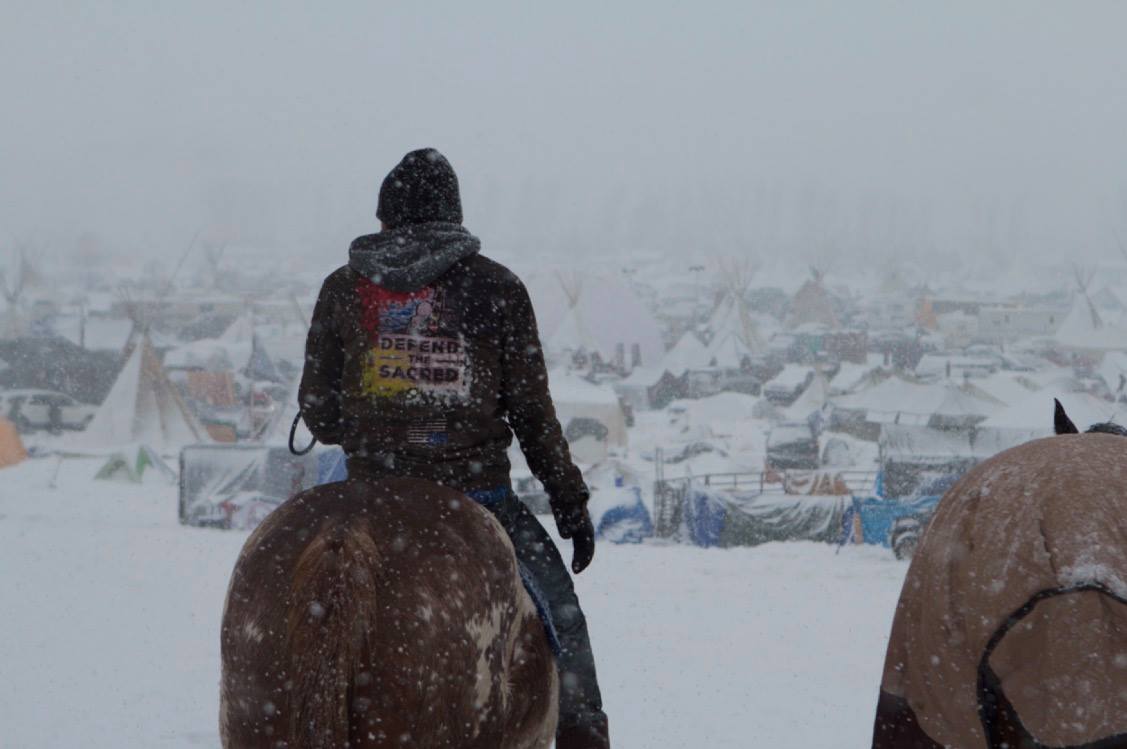
6. Standing Rock defeats the Dakota Access Pipeline. I know you’re leery about this one, and you have good cause. Donald Trump will almost certainly try to reverse this decision and it’s hard to think that a big part of the U.S. Army Corps of Engineers decision to reject DAPL is the giant middle finger it sends to the incoming administration. No one knows the fleeting nature of this victory better than the land and water defenders who withstood police brutality, sub-zero temperatures and a swarm of idiotic white liberals.
The Standing Rock Sioux taught America what treaty rights and traditional territories actually mean. It showed a generation of environmental activists that the only way to stop climate change is to put your body between a capitalist and his money. And it showed that courage, strength and community, with the right strategy, can still stand up to the immense wealth and power of industry, backed by state violence and mainstream media spin — and win.
It’s a lesson and a beacon for 2017: no one knows how to fight capitalism better than Indigenous people, because they’ve been doing it for centuries. When settlers get out of the way and let them lead, good things happen. So what do you say we make 2017 the year of a thousand Standing Rocks? After 2016’s shit picnic, it’s worth a shot.
Image: Facebook/Spencer Keeton Cunningham
Main image: Flickr/Dark Sevier
Like this article? Please chip in to keep stories like these coming.

